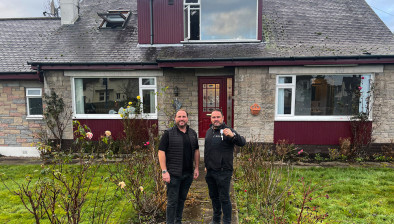Together pledges £500m of support for Scottish SMEs

Stuart Heslop
A property finance expert has identified small and medium housebuilders as “crucial” to addressing Scotland’s dire housing crisis.
Stuart Heslop, of lender Together, which provides corporate, commercial and residential property finance, this week signalled the finance company’s ambition to lend £500 million in Scotland.
He was speaking at an event at The Edinburgh Grand Hotel to celebrate the £7 billion lender’s 50th anniversary.
Mr Heslop said: “Whilst larger housebuilders and developers are crucial to addressing the country’s housing shortage, we believe that the real key lies with Scotland’s SMEs.
“It’s shocking to hear the statistics of just how few homes are able to be delivered by these businesses, and highlights a real lack of investment and support available.
“At Together, we are dedicated to doing all we can to helping organisations across Scotland access the finance required to deliver the housing we so desperately need.”
Since 2017, the proportion of housing in Scotland delivered by SME housebuilders has halved. Like much of the UK, the country faces a severe shortage of housing, with the Scottish Government announcing an official housing emergency in May this year.
According to a report from Homes for Scotland, 28% of Scottish households are in some form of housing need.
Further research from Together found that SME business owners and lenders based in Scotland are keen to invest an average of £1,030,499 into their business of the next two years, but industry failures and the government have held them back.
The same study showed that 19% believe that a lack of investment breaks and benefits from local and national government are creating barriers.
In its report, Homes for Scotland made recommendations to national and local governments, stating that an urgent cross-portfolio review into challenges facing SMEs was necessary. It also stated that new innovative funding streams and partnerships were needed to remediate and unlock sites.
Mr Heslop said: “So many issues in the market have caused SMEs to leave in droves. Rent caps, access to finance, supply and labour shortages; all have contributed towards making an environment that is difficult for SMEs to survive.
“As a result, we simply aren’t delivering the supply of housing needed. It’s imperative that lenders step up and help however we can.”
For Mr Heslop, the country’s political environment also raises questions for SMEs. With Labour now taking over the UK Government, he said the party now has an opportunity to consolidate its strength across Scotland ahead of the Scottish elections in 18 months’ time.
Mr Heslop said: “Labour in Westminster are about to enjoy a similar period of control that the SNP have worked with for the last decade or so at Holyrood. This election has however left Scotland pretty much hung between these two parties, and of course it will be a while before the Scottish people will feel a difference on the ground with the Scottish Election in May 2026.
“The big question for the people of Scotland must be, what are Labour going to do in the next 18 months to convince the Scottish electorate to continue to back them?
“The hope is, we will see a renewed focus on Scotland from Westminster, with increased investment to convince the public that Labour are the right party to lead the country forward after years of the SNP in power. I hope that this power struggle over the next 18 months will benefit the Scottish economy as Labour and the SNP fight for our vote.”
For housebuilders, Scotland doesn’t lack opportunity either, with a wealth of brownfield land available ripe for development, Heslop added.
A study earlier this year from Together found that currently over 93,000 properties are abandoned and derelict in Scotland, which could deliver nearly £18.5bn in value if redeveloped and planning eased. Furthermore, Homes for Scotland has said in its recent report that “SMEs are crucial for brownfield delivery”.
However, one key issue that still faces these companies is access to finance.
Mr Heslop said: “It’s clear that mainstream banks have lost much of their appetite to lend, and many are using restrictive ‘tick-box’ exercises to make lending decisions. Considering the turbulence of the last couple of years, many businesses may have historic credit issues completely out of their control, but that have since been addressed.
“However, too often these past issues make access to finance difficult for SMEs. We have seen a consistent move away from the relationship-based model of lending over the last decade with many high-street banks; they no longer have dedicated relationship managers who know their customer’s business. They have moved towards remotely managing each case by call centres.
“This makes it difficult to make informed lending decisions, as the processes are far too constrained. At Together, we strongly believe in maintaining that personal relationship with our clients. We take the time to understand their individual circumstances and make a judgement call based on common-sense.
“This is why we are dedicated to maintaining our connection with Scottish SMEs, and want to make it clear to them that we are here to help. If we are to give one clear message to them, it’s that even if you have phoned the bank and been told you have no options, you haven’t spoken to us yet.
“We are committed to lending £500m in Scotland, and we will continue to do all we can to help open doors for our new and existing partners.”





















